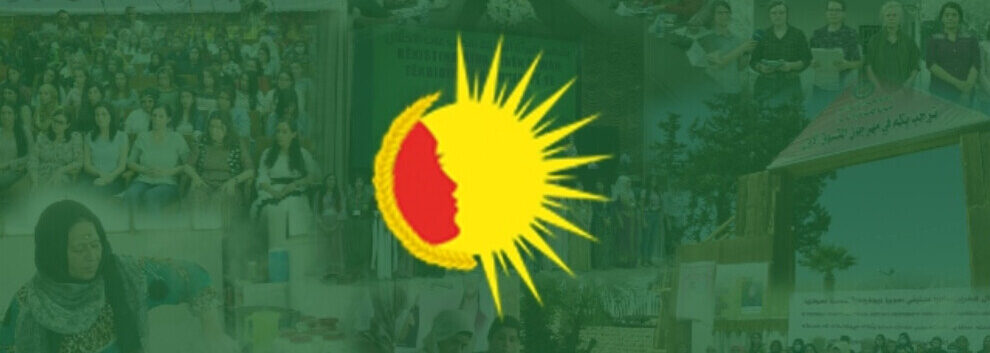Part One
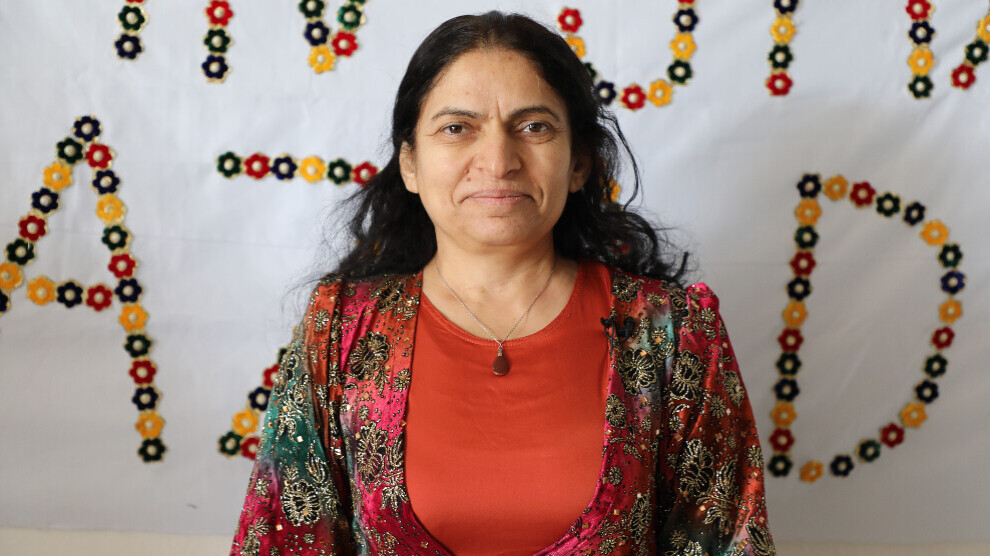
Influenced by Kurdish leader Abdullah Öcalan’s ideas on women’s freedom and organization as well as by the experiences of women militants, the people of Rojava formed their organization under the name of Yekîtiya Star on January 15, 2005.
The Kurdistan Freedom Struggle moved to another phase after Kurdish leader Abdullah Öcalan arrived in Rojava in 1979. Abdullah Öcalan, who influenced the Rojava area for 20 years, sowed the seeds of women’s organization from the lands of Rojava to the whole of Kurdistan. Considering the social reality and women’s reality, he has become a guide for women’s organisation.
Kongra Star Coordination Member Zeyneb Mihemed spoke to ANF about the process from the beginning of the women’s struggle in Rojava to the establishment of Yekîtiya Star. Mihemed recalled that the first woman organization in Rojava started with the arrival of Öcalan. “Previously, there was no organization where women could recognize themselves and fight and resolve problems. The arrival of Öcalan marked the real beginning of this struggle. Afterwards, the PKK’s struggle here helped women get to know themselves and form their organization.”
WOMEN COVERED A LONG WAY IN THE 1990s
Mihemed summarized the development of the women’s struggle as follows: “Women’s organisation in the region made further progress in the 1990s. Now, women in Rojava have gradually started to find the way to freedom to enable them to resolve their problems. Öcalan’s arrival in Rojava paved the way for this because Öcalan attached great importance to women. Commitment to the ideas of Öcalan led to an increase in struggle. Women’s participation in political and social activities began. There was no such thing before. Women had been secluded at home. They were not doing any work. Öcalan’s arrival helped women make progress not only in one area, but also in the entire public sphere.
WOMEN MADE THEMSELVES HEARD
Women were holding meetings where they proposed solutions to existing problems. With the activities carried out in the 1990s, women got to know themselves. The power that had been lost in history and seized by the rulers was reclaimed. Women thus came to the fore. Women made themselves heard in marches, uprisings, meetings, and martyrdoms. They were able to reveal that hidden power gradually.
WOMEN GOT STRENGTH FROM ÖCALAN
Öcalan carried out very important work in Rojava, the impact of which has remained until today. Many steps have been taken so far. Women are now active in every field, including political and military fields. With the strength they got from Öcalan, women have improved their organization.
WOMEN’S ORGANIZATION WAS NEEDED
Various activities were carried out to this end in Rojava. Afterwards, they were further expanded and reached all segments of society. Thus, a strong organization was needed to resolve the problems in Rojava. Öcalan had already laid the groundwork for it in Rojava. Afterwards, women declared their organization in Rojava so as to resolve the existing problems better. Thanks to the ideas of Öcalan and the women’s movement in the region, women have become able to take bigger and more important steps in Rojava.
WOMEN GATHERED UNDER THE ROOF OF YEKİTİYA STAR
In line with this need, the women of Rojava were organized under the name of Yekîtiya Star. The ideology of the Women’s Freedom Movement also provided a major support to this organization. This organization started with the philosophy of Öcalan, and then it emerged as a result of the struggle of the Kurdish Women’s Movement and the activities carried out in Rojava. Progress has been made in many ways. Ideologically, remarkable steps have been taken based on the perspective of the Women’s Freedom Struggle. Indeed, it was a significant support. The support of the military forces cannot be ignored, either. The support of the female guerrillas was significant. Our comrades in the mountains of Kurdistan protected the women and people in Rojava. If there had been no such defence, the defence mechanism in Rojava would not have reached its current level.”
Part Two
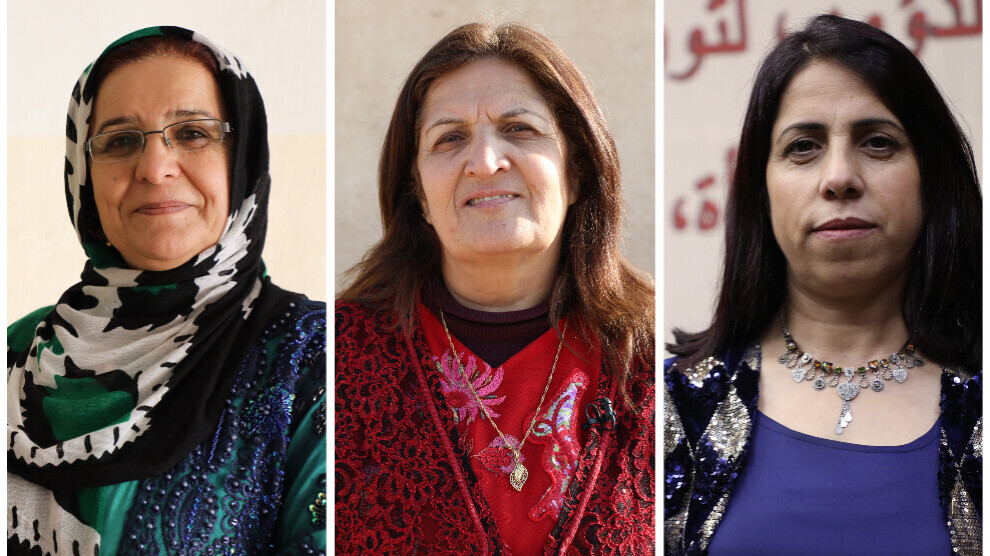
Following the establishment of Yekîtiya Star on January 15, 2005, the women’s organization went beyond the borders and spread throughout the region. Not only Kurdish women, but also women from all nationalities took part in this organization.
After the introduction of the free woman paradigm of Kurdish leader Abdullah Öcalan and the Kurdistan Women’s Freedom Movement’s activities in Rojava, people of the region decided to organize their own unique organization. Women, mothers and activists within the women’s liberation struggle started to discuss the structure, name and the form of organization. These discussions were concluded on January 15, 2005, and the Rojava women’s struggle continued with the establishment of a new organization called Yekîtiya Star.
Kongra Star Spokeswoman Remziye Mihemed, who took part in the establishment of Yekîtiya Star, Aîfe Bekîr, Member of the Foreign Relations Department of the PYD (Democratic Union Party) General Assembly, Felek Yusif, Kobanê Canton Intellectuals Association Co-Chair and Şaha Xelîl, Qamishlo Canton Kongra Star Spokeswoman, talked to ANF about the establishment process and the initial activities.
A GROUP OF REVOLUTIONARY WOMEN AND MOTHERS
Remziye Mihemed, who took part in the establishment of Yekîtiya Star, gave an outline of the process: “Yekîtiya Star was founded on January 15, 2005, by a group of revolutionaries and mothers. Those who carried out the women’s struggle in Rojava were the main pillar of this organization. With the women’s organization that we launched secretly, we were able to lay a strong foundation for Rojava Kurdistan and the women’s revolution. The main foundation of Yekîtiya Star is the Kurdistan Women’s Freedom Struggle. Those who fought in the mountains became models for the organization there.”
WOMEN’S ORGANIZATION EXISTED EVEN BEFORE YEKITIYA STAR
Arife Bekîr from Afrin is among those who contributed to the establishment of Yekîtiya Star. PYD General Assembly Foreign Relations Assembly member Bekir pointed out that they had started their activities in Afrin in the 1980s. She said: “Those were very difficult and good days. We were working with love and great enthusiasm. We were asking questions such as what the Kurdish question is, who we are, where we come from, why we are oppressed. In this respect, we worked together with the people in Afrin. Women’s organisation existed even before Yekîtiya Star. We were improving our education and organization based on women’s experiences. We continued our work for our freedom and independent Kurdistan with determination.”
AFRIN WAS IMPORTANT FOR ORGANIZATIONAL ACTIVITIES
Bekir continued: “In Afrin, which is known as a pro-women city, activities had a tremendous impact. After realizing the fact that women were not strong enough and organized there, a strong initiative was introduced. We were constantly asking ourselves why men were active in every field, while women were not. We were saying that there should be equality between men and women, and we were seeking our rights.”
OPPRESSION AND TORTURE DID NOT PREVENT WOMEN
“Before the establishment of Yekîtiya Star, we worked as a militia. Our job was to organize society and women. We were conducting our work clandestinely. In the past, it was considered shameful by society for a woman to work and visit families. It was not considered appropriate for women to go out and work in public. We were suppressed by family, society and the state. We were nevertheless carrying out our activities in public. In 2008, I was arrested by the state and put in prison. We were subjected to a serious crackdown and torture in prison. However, we did not change our decision and we remained committed to achieving our freedom. Thus, we did not abandon the struggle. We started with a group of women. In the beginning, there were only Kurdish women. Over the years, Arab and Syriac women also joined this organization,” Bekir stated.
WOMEN’S ORGANIZATION BROUGHT ABOUT HOPE AND ENLIGHTENMENT
Felek Yusif, who participated in the establishment phase in the Kobanê region, talked about the struggle and her involvement as follows: “After I got married in 1993, I familiarized myself with the women’s struggle. I got to know myself through the impact of the organization on women and society. It brought about hope and enlightenment for us. Even before Yekîtiya Star was founded, women were carrying out a struggle here. However, it was not institutional because of the Baath regime. We were carrying out the struggle as militias. We were visiting homes, resolving family problems. We were in constant communication with women. We received training in secret. There were many obstacles while carrying out our activities. Both the state crackdown and tribalism were challenges to our organizational activities.”
WOMEN SURPASSED THE STATE AND TRIBALISM
Yusif continued: “There were activities everywhere and they were carried out in secret. Especially in Ain Issa, the Kurdish families involved in organizational activities were in the public eye since the majority of the population was Arab. So, they were gathering clandestinely. What made Kobanê different from other regions? It was just us, the Kurds, involved in the work there. The activists there supported and covered each other, but those working in other areas were reported to the government and had their homes raided by the state forces. The biggest challenge to carrying out activities in Kobanê was imprisonment. Customs and manners in Kobanê regarded the imprisonment of women as indecent. The government knew this well, so it couldn’t suppress women much. However, the state forces increased pressure after realizing that women were advancing gradually. By improving their organization, women could also surpass the narrow traditions of the tribes.”
THANKS TO THE LEADER AND THE FREEDOM MOVEMENT
Shaha Xelîl from Qamishlo is one of those women who have been struggling since 1986-1987. Xelîl said: “We rely on the line of women’s freedom against the patriarchal mentality that has supressed us for centuries. Because of this mentality, we were deprived of all our rights. We are still fighting against it. This is thanks to the Freedom Movement and Öcalan’s philosophy. Women began to search for their genuine self after Öcalan began to promote women’s freedom and rights. The most important contribution in North-East Syria was made by the Freedom Movement fighters. In the 1980s, 1990s and afterwards, the women fighters of the Freedom Movement were active all over Syria. It was the first attempt for the Kurdish women to organize themselves in every field. It was a very difficult process for us. Society was petrified because of the pressure of both the Baath regime and the traditions and customs of the patriarchal mentality. Women were involved in political and military activities for the first time. Thanks to the Freedom Movement militants, more women joined the women’s movement to expand the organization and the freedom struggle.
THE WORK WENT BEYOND KURDISH REGIONS
While activities had been carried out mostly in the Kurdish regions before, Yekîtiya Star carried out work to reach all components and gather them under a single roof. Now, activities have spread across Rojava and all of Syria. When Yekîtiya Star was founded, our numbers were very small. Work was underway throughout the Cizîre region through mothers such as Esma, Comrade Remziye, Mother Hogir and Comrade Hanife. When necessary, we were active in the committees of economy, justice and defence as well. We did all the work together. We were making family visits and organizing participation. The pressure of the Baath regime was also very intense. Mother Esma, Mother Hogir and many other women activists were jailed. It wasn’t easy at all. Both the state forces and the customs of society were challenging. Nevertheless, as Yekîtiya Star, we insisted on our work and struggle. We have come to these days thanks to this persistence.”
Part Three
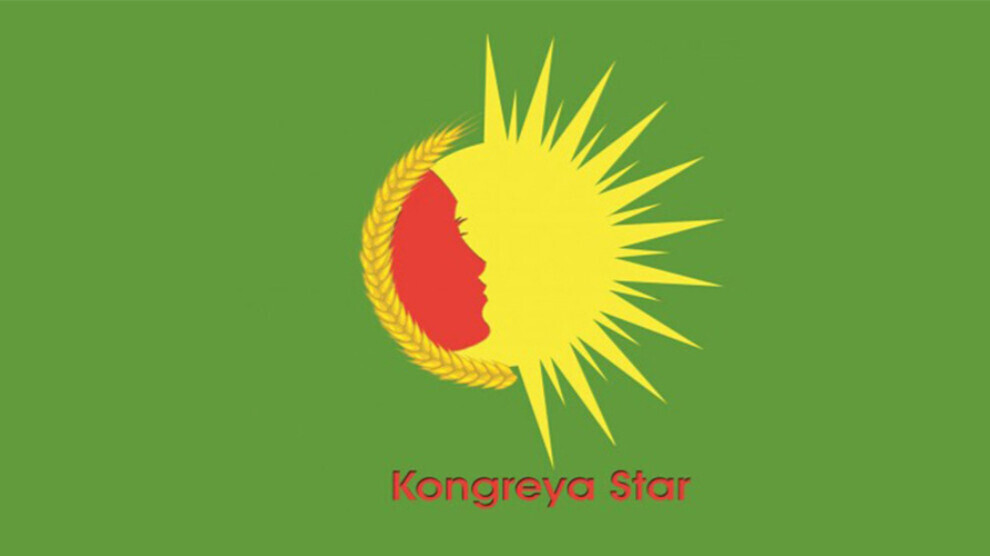
In North-East Syria, every house has become a women’s organization centre in 12 years, and moreover, men have been given education on women’s freedom.
Kongra Star Spokeswoman Remziye Mihemed who has played an active role in the activities of Yekîtiya Star since its establishment, and PYD General Assembly Foreign Relations Department Member Aîfe Bekîr spoke to ANF about the 12-year organizational process of Yekîtiya Star, which has achieved many important accomplishments in the region for 12 years, from education to justice, from economy to cooperative work.
NEW CONGRESSES
Kongra Star Spokeswoman Remziye Mihemed stated that they expanded their organization by carrying out activities clandestinely under the pressure of the Baath regime. She said: “The congress was held every two years. The 2nd Congress was held in the Enize village of Qamishlo, and the next ones in Aleppo and in Afrin. It was important to organize meetings for the formation of women’s power, organization, willpower and self-education. We have succeeded in being a model for all women’s organizations and all other peoples. We showed everyone that they could form their own unique organizations.”
IT WAS TARGETED AS IT GREW
Remziye Mihemed pointed out that those who played a leading role in this struggle were constantly targeted. She continued: “We created the existence of women in this revolution. Attacks and conspiracies against us are increasing, targeting our friends and our administrators. They seek to weaken the will of women. However, we see that women’s struggle and organization are gaining prominence in all areas of life. Kurdish women have been able to play a major role in the revolution through their organization and presence. They could play a major role by taking part in all assemblies and committees. We lost thousands of martyrs. Our Euphrates Region Coordination was targeted. All this clearly demonstrates that our struggle has accomplished a result and disturbed the ruling mindset.”
ORGANIZATION BROUGHT ABOUT VICTORY
Mihemed emphasized that this situation could be better seen in the ISIS attacks. She underlined that despite all the attacks, they continued to expand their organization: “When there were attacks on Kurdish cities, Kurdish women showed everyone how they organized themselves and confronted these attacks and ISIS atrocities. Women from all the folks in the region were inspired by this and formed their own unique organization. They took part in all assemblies, committees and organizations. We were able to play a major role in the region with the co-presidency system. Women have seen that when they are organized and educated, they can stand against all attacks and atrocities and lead their activities to victory.”
WOMEN’S INSTITUTIONS OPENED
Aîfe Bekîr pointed out that they expanded their work by promoting the concepts of free women, free society and equality. She said: “At Yekîtiya Star’s 2nd Congress, we decided to include not only Kurdish women but also women from all other peoples in our work and organization. We concluded that women should fight for their freedom wherever they are, based on the concepts of free women, free society and equality. We made a lot of decisions based on the freedom of society and women.
Noting that the whole process was carried out under the seal of secrecy, Bekîr added: “The 3rd congress was held in Kefer Sixîre in 2009. Many decisions were taken during this congress. The process was very difficult in the beginning, but it grew easier in time. There were no institutions back then. Activities were carried out in houses. When we had a meeting, we held it clandestinely. It was a very difficult process. Organizational activities, which had been carried out in houses once, were now carried out through dozens of women’s organizations in all fields of the revolution.”
Part Four
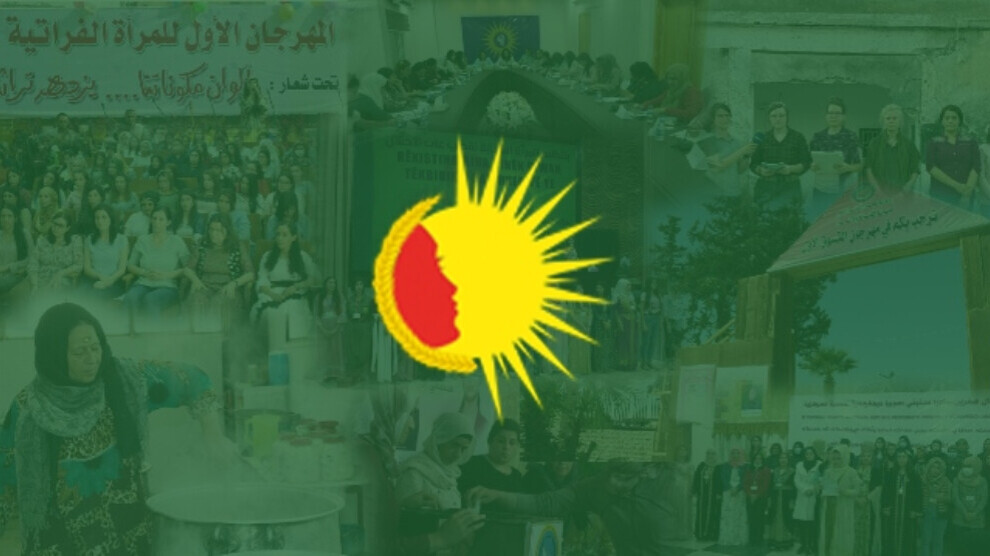
Rojava women’s struggle began with Yekîtiya Star and moved to a new stage on 26 February 2016 under the name of Kongra Star.
The 12-year legacy of the struggle carried out by women organized in Yekîtiya Star, moved to a new stage on 26 February 2016, when it took the name Kongra Star.
Kongra Star has managed to cross borders and reach the world. Representative offices have been opened in many countries, and other women in the world joined the struggle.
Qamişlo Canton Kongra Star spokesperson, Şaha Xelîl, and Kobanê Canton Intellectuals Union Co-chair, Felek Yusif, who took an active part in the struggle from beginning to the new organizational transformation, talked about the new organization of the struggle and what happened during the transformation process.
Conversion was necessary
Şaha Xelîl, who has been active from the establishment of Yekîtiya Star right through the establishment of Kongra Star, said: “There was a need to transform into Kongra Star in order to develop and grow. Kongra Star played a crucial role in this growth. The women who are now organizing in liberated areas have perhaps surpassed the original organization of Kurdish women. I think, for example, of how Zenobiya Women’s Community was established and organized in all fields there.”
Felek Yusif, co-chair of the Kobanê Canton Intellectuals Union, underlined that the source of strength in this growth and transformation is the guerrilla resistance. “We used to get our strength from the guerrilla resistance in the Medya Defense Areas to carry out our work with difficulty in regions like Kobanê where there was intense pressure. We knew that there was a place where we had our strength and our defense.”
Felek Yusif added that the influence of Kurdish people’s Leader Abdullah Öcalan in Kobanê is fundamental to the continuity and increase of these efforts. Yusif pointed out that women continue to struggle despite all kinds of oppression and torture and added: “When we were walking around our city after the regime on 19 July [2012], it was so breath-taking to see that everywhere was decorated with our women’s organization flags. The dream has come true. It was a very different feeling.”
Part Five
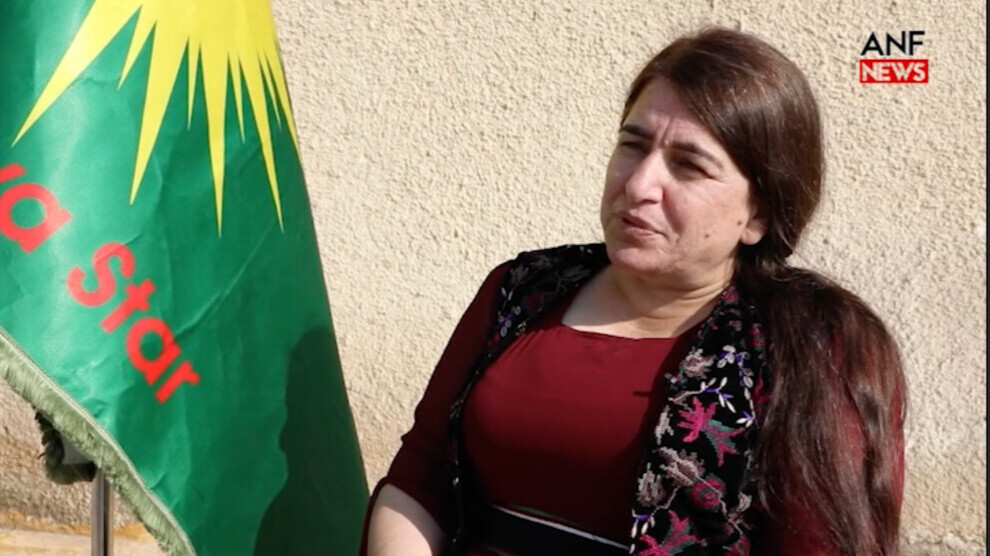
Kongra Star, which is based on the Democratic Confederalism project, carries out a struggle that reaches women all around the world.
Kongra Star organized its activities in many fields, from self-defense to economy through communes and cooperatives.
Kongra Star’ members are also members of the commune. Assemblies are organized in towns, regions and cantons. Kongra Star is based in a democratic society and free women on the basis of women’s revolution, women’s knowledge and awareness, starting from the family system.
There are different committees, namely the Freedom for Leader Abdullah Öcalan Committee, Free Sovereignty Committee, Self-Defense Forces (Composed of Internal Security Forces-Women, Self-Defense Forces-Women), Disciplinary Committee, Alliances and Democratic Policies Committee, Education and Academy Committee, Social Committee, Political Committee, Law and Justice Committee, Economics Committee, Financial Economy, Culture and Arts Committee, Press Committee, Health Committee and Ecology Committee.
Speaking to ANF, Kongra Star Coordination member, Cîhan Hisên, underlined the difficult journey of the freedom struggle, from militia activities to Yekîtiya Star, from Yekîtiya Star to Kongra Star. Hisên said: “Before 2016, there was a woman’s legacy stretching from Damascus to Dêrîk. Leader Apo [Abdullah Öcalan] laid the foundation of this legacy in terms of social, political and education. Yekîtiya Star was founded in 2005, based on the experience of the 80s. From 2005 to 2016, the discussion about how to establish the system and how to organize after the revolution was deep and inspiring. As the result of this discussion, Kongra Star was established.
Organization through the family
Cîhan Hisên noted that after the establishment of Kongra Star, they primarily trained families, children and young people through women in order to raise awareness and added: “On this basis, it was one of our main goals to organize through the family. Thus, it organized itself in society and worked within society and the revolution.”
YPJ is part of this system
Cîhan Hisên said: “If an organization wants to develop in terms of politics and diplomacy, the defense mechanism is definitely a priority. We responded to this with the establishment of the YPJ.”
New economic projects
Kongra Star organizes itself according to Democratic Confederalism. Cîhan Hisên says that this means the YPJ on one side and the economy on the other, and added: “Kongra Star has led the way across the North East Syria Region in terms of economy. In many provinces, districts and villages, livelihood projects were carried out for women. Another of our goals is to create new economic projects in NorthEast Syria and so reach tens of thousands of women.”
The efforts of the Education Committee
Hisên continued: “Our Education Committee worked hard to raise awareness among Kurdish, Arab, Armenian, Assyrian and Circassian women and to spread the science of women, and valuable results were achieved. Our education system was also beneficial for women. Our education system is effective in changing the patriarchal mentality and creating a democratic family. With this education system, we also emptied the targets set by the enemy.”
North East Syrian Women’s Assembly
Cîhan Hisên said that the North East Syrian Women’s Assembly was established after the birth of Kongra Star and added that “such an assembly was needed in order to gather all parties, institutions, organizations and nations under one roof. The announcement of the North East Syria Women’s Assembly was actually one of the targets set by Kongra Star.”
Hisên said that they have representatives in some European countries, as well as in Lebanon, Bashur Kurdistan and Damascus. “Our goal is to reach the whole world. As Kongra Star, we did not only reach Kurdish women. Kongra Star organizes through the Democratic Confederalism project and sets goals and projects involving other components. As Kongra Star and Kurdish women, we led Armenian, Syriac, Arab and Circassian women. This system has had great effects on other societies. Our model will appeal to all nations. Beyond that, we need to work harder for a more effective, permanent and organized system.”
Part Six
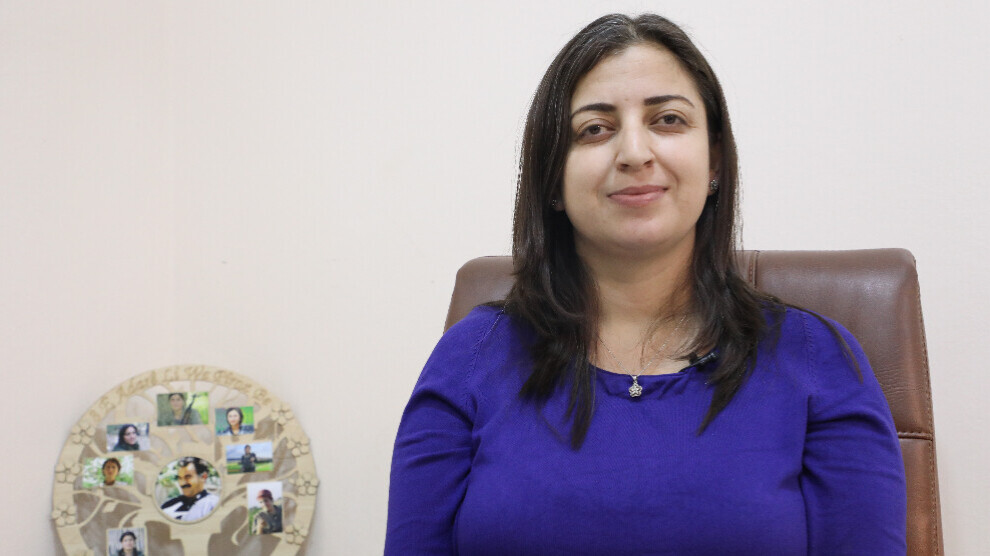
52 women’s organizations have been getting organised more efficiently under the umbrella of the Women’s Assembly of North-East Syria.
The Women’s Assembly of North-East Syria was established on 14 June 2019 based on three main principles. The Assembly, which includes 52 women’s movements from Kurds, Arabs, Syriacs, Armenians, Chaldeans, Turkmen and Circassians, is currently drafting a constitution for the future of Syria.
The Women’s Assembly Coordination Member Jîyan Hisên answered ANF’s questions about the development of women’s struggle in North-East Syria.
How did the idea of such an organization emerge? How was the preparatory work?
With 12 years of Yekîtiya Star experience, which was followed by Kongra Star, women liberated many areas during the course of the revolution and played a role in society in the fields of military, diplomacy, cultural, political and economy. Yet, there was no assembly that brought women together in a common environment. Each party, non-governmental organisation, political party, institution and organization carried out activities in its own field. After the liberation of Raqqa, Tabqa, Deir ez-Zor and Manbij, there was a need to form an assembly. Under the leadership of Kongra Star, women and their movements in the region took a major step in 2019 following an agreement that there should be a women’s assembly to unite other assemblies in all fields. A preparatory committee visited political parties, non-governmental organizations and independent institutions and organizations in the region. The purpose was to establish women’s assemblies for all activities and to gather them under one roof. All the organizations that were visited presented a favourable opinion about the project. Gathering women under one roof was a reaction against both occupation and femicide.
When and where was the Women’s Assembly of North-East Syria established, what organizations does it include?
The Congress to found the Women’s Assembly of North-East Syria was held in Amude on June 14, 2019. The draft charter of the assembly, designed by the Preparatory Committee, was submitted to the congress and approved. On June 11, 2021, the 1st Congress was held. Within the Women’s Assembly of North-East Syria, there are 52 women’s movements and organizations that include women’s assemblies, 18 non-governmental organizations, Chaldean, Syriac, Circassian, Armenian and Turkmen peoples and independent institutions and organizations.
Two representatives from each organization take place in the assembly. Before the establishment of Zenobiya Women’s Community, there had been representative agencies in liberated areas. Each region had three representatives. Women representatives and women’s youth organizations from the Autonomous Administration institutions are also included, as well as some independent women.
How many offices does the assembly have and where?
Originally, there was no intention of forming assemblies in all provinces. We just wanted to establish a central office in Qamishlo. We wanted to carry out our activities through representatives which were already organized in all provinces. However, with the occupation of Serêkaniyê and Girê Spî and the movement restriction after the Covid-19 pandemic, it was necessary to open a central office to carry out our activities more efficiently in other regions such as Kobanê, Raqqa, Tabqa and Deir ez-Zor. Thus, a central office was opened in Raqqa. Based in Qamishlo and Raqqa, our activities take place across North-East Syria.
What committees does the assembly have and on what basis are its activities carried out?
After the assembly was founded, two committees came to the fore; the Women’s Law Committee and the Constitutional Committee. Afterwards, the Women’s Organizations Action Platform was established.
Concerning the activities of the Women’s Law Committee, the Women’s House and the Women’s Justice Council were established in 2014. These were promoting the revolution. The laws enacted were restricted to the Cizîre Region due to attacks. After a discussion of ways to develop it, it was concluded that everyone from all over North-East Syria should take part in this committee, and it was thus expanded. A draft concerning the activities of this committee was prepared until the first congress of the Women’s Assembly of North-East Syria. The draft was approved at the congress. Afterwards, this committee was able to carry out its activities efficiently everywhere. We used to call it ‘women’s law‘, but it was changed into ‘family law’ to include children and families. We put this law into practice in the Cizîre region. In the future, we will gather women and present it to them in Kobanê, Shehba and liberated areas. It is more urgent in those regions.
Concerning the activities of the Constitutional Committee, we established this committee throughout North-East Syria as we believed that a solution could only be offered there under the leadership of women. Representatives of all peoples take place in it. It introduced a strong outline of what the women of North-East Syria want for the future of Syria, and it continues to work effectively. It was founded to meet the demands of the whole society, especially of all women in Syria. Institutions other than the assembly were also asked for their opinions. We wanted to be ready in advance by the time the Syrian Constitutional Committee work kicked off. This committee was established on this basis.
Moreover, the Women’s Organizations Action Platform was founded. The activities of this platform, which had been carried out within Kongra Star before, were transferred to the assembly. This platform was established to mark important days and to take action against attacks directed against women.
Has there been any disruption to the goals of the Assembly?
With our organization based in North-East Syria, we set the goal of reaching women and their movements in Syria, the Middle East and all over the world. We also organized online forums due to the travel restrictions introduced in the region for different reasons. We are working to spread the achievements and experiences gained through the revolution to the whole world. Women in the Middle East who participate in these forums express that they take inspiration from this revolution.
The attacks and embargo against the region affect the work of the assembly negatively. Without these, our work would have been more efficient. We discuss ways to overcome these shortcomings in the future. We hope to overcome them quicker through the congresses we hold every two years.
